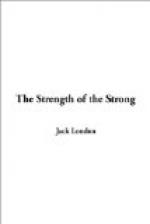The police were struggling to clear a passage. The driver of the coal waggon, a big man in shirt sleeves, lighted a pipe and sat smoking. He glanced down complacently at a captain of police who was raving and cursing at him, and his only acknowledgment was a shrug of the shoulders. From the rear arose the rat-rat-tat of clubs on heads and a pandemonium of cursing, yelling, and shouting. A violent accession of noise proclaimed that the mob had broken through and was dragging a scab from a waggon. The police captain reinforced from his vanguard, and the mob at the rear was repelled. Meanwhile, window after window in the high office building on the right had been opened, and the class-conscious clerks were raining a shower of office furniture down on the heads of police and scabs. Waste-baskets, ink-bottles, paper-weights, type-writers—anything and everything that came to hand was filling the air.
A policeman, under orders from his captain, clambered to the lofty seat of the coal waggon to arrest the driver. And the driver, rising leisurely and peacefully to meet him, suddenly crumpled him in his arms and threw him down on top of the captain. The driver was a young giant, and when he climbed on his load and poised a lump of coal in both hands, a policeman, who was just scaling the waggon from the side, let go and dropped back to earth. The captain ordered half-a-dozen of his men to take the waggon. The teamster, scrambling over the load from side to side, beat them down with huge lumps of coal.
The crowd on the sidewalks and the teamsters on the locked waggons roared encouragement and their own delight. The motorman, smashing helmets with his controller bar, was beaten into insensibility and dragged from his platform. The captain of police, beside himself at the repulse of his men, led the next assault on the coal waggon. A score of police were swarming up the tall-sided fortress. But the teamster multiplied himself. At times there were six or eight policemen rolling on the pavement and under the waggon. Engaged in repulsing an attack on the rear end of his fortress, the teamster turned about to see the captain just in the act of stepping on to the seat from the front end. He was still in the air and in most unstable equilibrium, when the teamster hurled a thirty-pound lump of coal. It caught the captain fairly on the chest, and he went over backward, striking on a wheeler’s back, tumbling on to the ground, and jamming against the rear wheel of the auto.
Catherine thought he was dead, but he picked himself up and charged back. She reached out her gloved hand and patted the flank of the snorting, quivering horse. But Drummond did not notice the action. He had eyes for nothing save the battle of the coal waggon, while somewhere in his complicated psychology, one Bill Totts was heaving and straining in an effort to come to life. Drummond believed in law and order and the maintenance of the established, but this riotous savage within him would have none of it. Then, if ever, did Freddie Drummond call upon his iron inhibition to save him. But it is written that the house divided against itself must fall. And Freddie Drummond found that he had divided all the will and force of him with Bill Totts, and between them the entity that constituted the pair of them was being wrenched in twain.




